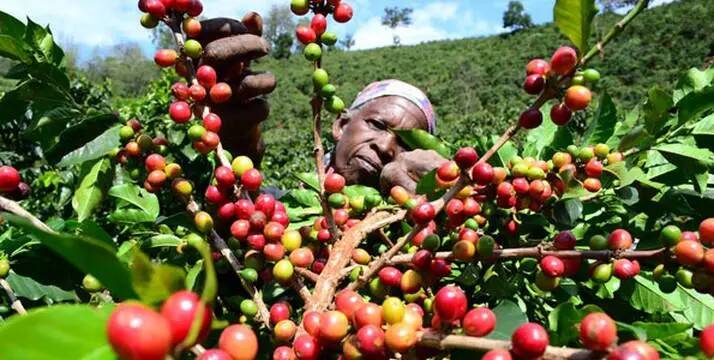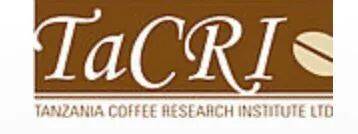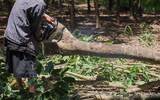Introduction to coffee development, coffee varieties, SL28, rose summer varieties and Kilimanjaro coffee in Tanzania
Tanzania is located in eastern Africa, bordering Kenya, Uganda, Zambia, Rwanda, Burundi and other countries. The eastern coastal areas and inland lowlands of the country have a savanna climate, while the western inland plateau has a tropical mountain climate.

In some coffee history, coffee was introduced into Tanzania from Ethiopia in the 16th century, and later became a cash crop in Tanzania during German colonial rule. At present, the country is growing iron pickup, bourbon, Kent and self-developed disease-resistant and disaster-resistant varieties. The Tanzanian Coffee Institute Tanzanian Coffee Research Institute (TaCRI) was established and operated in 2001 as a non-profit organization with the goal of revitalizing the coffee industry in Tanzania. The Institute provides important public services to stakeholders in the country's coffee industry to improve productivity and quality, while improving the profitability of producers and the competitiveness of Tanzanian coffee in the global market.
With regard to Tanzania's contribution to coffee, TaCRI has so far released 23 improved coffee varieties in crop improvement research, including 19 Arabica hybrid varieties and 4 Robusta varieties. Including KP423.

KP423 is one of the varieties released in Tanzania and is selected from the Kent variety. Kent is a hybrid variety of iron pickup found in the Kent Cafe Garden in Mysso, India in 1911. It is a hybrid of S288 and iron pickup. It has the characteristics of high yield and resistance to leaf rust. So it was introduced to Kenya, Indonesia, Tanzania and other parts of East Africa. Kent was part of an intensive selection program for Lyamungu research stations in Tanzania in the 1920s. KP423 was released in Tanzania in the 1940s and sent to Uganda, where it is an important variety in the Arabica growing area. However, at present, the resistance of this variety to leaf rust has been exhausted.
In addition, the well-known Kenyan coffee variety SL28 is also related to Tanzania. SL28 is a single breed selected and launched by Scott Laboratories that year. Today, the laboratory has been renamed Kenya National Agricultural Laboratory (NARL). In 1935, a senior coffee officer at Scott Lab selected from a single tree named Tanganyika Tanganyika (now Tanzania) drought-resistant population and brought it back to Scott Lab. SL28 is the descendant of this variety.
In fact, the famous Panamanian rosy summer also has something to do with Tanzania, which was first collected from the coffee forests of Ethiopia in the 1930s and later sent to the Lyamungu research station in Tanzania, and then taken to Centro Agron ó mico Tropical de Investigaci ó n y Ense ñ anza (CATIE Centre for Tropical Agriculture and higher Education) in Costa Rica in 1953, where it was recorded as T2722. After it was recognized as resistant to coffee leaf rust, it was distributed throughout Panama through CATIE in the 1960s.
Qianjie also has coffee from Tanzania, choosing beans from the Kilimanjaro volcano in the northern highlands, using a washing treatment. Using the V60BI 1RU 15 way of cooking, there will be citrus, berry flavor, honey-like sweet taste, smooth taste like tea.
Important Notice :
前街咖啡 FrontStreet Coffee has moved to new addredd:
FrontStreet Coffee Address: 315,Donghua East Road,GuangZhou
Tel:020 38364473
- Prev

Unexpectedly, hand-brewed coffee will also have a channel effect!
The "channel effect" refers to the fact that water relies on inertia to find a shortcut and pass through it in the process of extraction. because this part of the water which takes a shortcut does not play a complete extraction role, it eventually leads to a phenomenon of uneven extraction. When Qianjie often mentions the channel effect, it is mostly related to espresso.
- Next

EU forest regulations have a great impact on small coffee farmers and may aggravate non-compliant coffee supply and undermine market prices.
Recently, Andrew, a contract consultant and team leader of the agroforestry restoration project funded by the East Timorese government, said that the non-deforestation regulations issued by the European Union would affect East Timor's coffee exports and affect most small farmers. The main reasons for land use change and deforestation in agriculture are only
Related
- What grade does Jamaica Blue Mountain No. 1 coffee belong to and how to drink it better? What is the highest grade of Blue Mountain coffee for coffee aristocrats?
- What are the flavor characteristics of the world-famous coffee Blue Mountain No. 1 Golden Mantelin? What are the characteristics of deep-roasted bitter coffee?
- Can I make coffee a second time in an Italian hand-brewed mocha pot? Why can't coffee be brewed several times like tea leaves?
- Hand-brewed coffee flows with a knife and a tornado. How to brew it? What is the proportion of grinding water and water temperature divided into?
- What is the difference between Indonesian Sumatra Mantinin coffee and gold Mantinin? How to distinguish between real and fake golden Mantelin coffee?
- What does bypass mean in coffee? Why can hand-brewed coffee and water make it better?
- Unexpected! Ruixing Telunsu lattes use a smoothie machine to foam milk?!
- % Arabia's first store in Henan opens into the village?! Netizen: Thought it was P's
- Does an authentic standard mocha coffee recipe use chocolate sauce or powder? Mocha Latte/Dirty Coffee/Salty Mocha Coffee Recipe Share!
- What is the difference between Vietnam egg coffee and Norway egg coffee? Hand-brewed single product coffee filter paper filter cloth filter flat solution!

